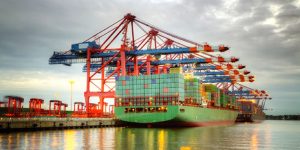By: Kristina Thoren, 2L
Flashed upon many of our news screens there have been news articles detailing a second wave of COVID-19 coming. There is now a strong urgency to make sure there is a collaborative international response to deal with governance frameworks that impact international trade. No country can entirely be self-sufficient, trade is needed for the efficient production of supply of basic goods and services. Keeping trade open is necessary to keep shelves plentiful and the economy healthy. For economic development to continue, strongly globalization and strong international trade are needed. With the COVID-19 pandemic, there has been a huge setback and large cost to the trading industry. With more and more people becoming infected many governments are limiting trade at the global level. These restrictions are interfering with business, travel, and especially freight transport.
Trade amid countries took a massive hit as production had to slow and at some points halted to be able to keep up with COVID-19 guidelines. Some of the most impacted economies are the European Union as they dealt with an impact of 15.6 Billion USD on trade flows. The United States had the second largest impacted economy of 5.8 Billion USD on trade flows. Another massive effect of the pandemic is the sharp increase in prices. As the demands are low for many items and travel restrictions are increased, the prices of many commodities are getting higher and higher. In many places where they are dealing with a shortage of supplies, the prices of essential goods are rising which makes it difficult for many people to afford necessities especially if their jobs have been impacted by the pandemic.
According to the World Trade Organization, global services trade has plunged by an astounding 30% as many people are not traveling internationally. Sectors that call for close physical proximity dropped sharply like recreational services, construction, and architectural services. Researches have determined that there has been a supply shock due to the low employment rates in many countries.
Surprisingly, the agricultural sector has been faring far better than the previously mentioned sectors. Agricultural trade takes place mostly in bulk marine shipments that have not had any significant disruptions. Staple food and processed fruits and vegetables were highly requested and imported which reflected the initial panic buying that occurred during the beginning of the pandemic.
International trade improved in the third quarter as some countries removed or reduced their COVID-19 restrictions to help alleviate the burden on their economies. There is a shift in the supply chain as many people only wish to purchase the essentials. With many people working from home and students now attending school from home, office equipment had the highest demand and volume increases. Computer and technology sales also were up. Nonetheless trade in the energy sector remains 35% below last year’s level.
COVID-19 has endangered people’s lives and their livelihoods. This enormous impact on trade has consequently impaired jobs and overall economic wellbeing. Governments around the world should make their trading practices clear, allow the distribution of essential goods without delays, and develop policy actions that look into the future and weigh varying international trade scenarios.





